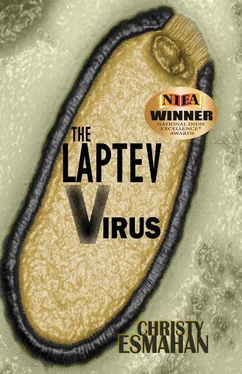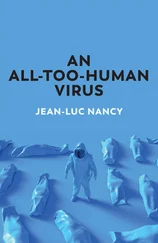Oscar grimaced.
“The workers were pretty upset of course, but they decided to rescue the pieces, and labeled them as ‘contaminated’ but figured that the lab might still learn something, so they transported them back to the barracks. Now we know that this was another grave mistake, and perhaps it was the biggest one of them all.
“A few hours after they returned to the barracks, all four of the individuals who had been at the drill site, including the hazer, began to develop flu-like symptoms. The infection advanced quickly, and in three of the four people, it developed into hemorrhagic fever.”
At this point in her narrative, Angela stopped and swallowed. The gruesome images were seared into her mind. She had never met the men, but she regretted the loss of life, especially when it had been so sudden and obviously painful.
She had an uncle who had been an engineer and had died when a unit exploded at the refinery where he worked in Texas City ten years ago. As with all accidents, there had been multiple causes and compounded human errors. A valve had accidentally gotten stuck in the “open” position, and someone else had not followed safety procedures. He had driven a pickup truck, parked it too close to the unit, and left the motor idling. Forensic analysts said that a spark from the engine had ignited the leaking gas, killing both her uncle and the truck driver. Angela had been a senior in college at the time, and after the funeral she had decided to make health and safety her career.
“We lost two of the men who were part of the exploration team that day,” she said, her voice somber.
“The hazer?” asked Oscar.
“He lived, as did one other worker, an older man named Ted. But that’s not all. Within a day, the lab technicians who were working in the barracks and had begun to examine the ice core sample also became ill, and several of them passed away too. Meanwhile, since everyone up there in the barracks lives in close quarters, several more workers became ill and pretty soon there was a full-blown epidemic in the little building.”
“They didn’t radio for help?”
“They tried,” said Angela, looking out of the window. The warm Houston day was fine and a huge, light blue sky hung over the buildings. Just a block away she could see the dark green tree tops peeking out from Hermann Park.
The UT Medical School building was sleek and modern and had a funny smell. When Oscar had met her downstairs he had given her a brief tour of the building. She had wrinkled her nose at the smell and he had explained that it was due to the autoclaves, which were the sterilization ovens that were located on each of the different levels. In any case, the peaceful scene around her could not be more different from the one the men in the Laptev Bay barracks had experienced.
“They tried to call for help, but the storm knocked out communications for two days. That’s not unusual, even at this time of the year, but normally there isn’t an epidemic to deal with.”
“And the bodies?”
“They burned most of them, fearing the contagion. As soon as we received the distress calls, we immediately sent in doctors to try to contain the situation. Naturally, we hadn’t realized how desperate the situation had become, but when the doctors saw the gravity of the circumstances, they decided to close the barracks and airlift everyone out. They brought them here to Houston for hospitalization—this was just a few days ago, and we’ve managed to keep it out of the news so far. We certainly don’t need another Ebola scare, and we don’t want to make any statements to the press until we understand what we are dealing with. We’ve managed to keep the patients in quarantine, and we got some tissue samples analyzed. So far, all we know is that the contagion seems to be a large virus, one of those megaviruses that have been found in different places around the world in inhospitable environments. This is a new one that has never been encountered before. It’s being called the Laptev hemorrhagic fever virus, or Laptev HFV.”
“And you want the university to help with the research?” asked Oscar.
Angela arched an eyebrow as if to say, Duh! Hello! Why else would I be telling you this?
Oscar lowered his head. “Yes, of course,” he said softly. “We’ll be happy to do what we can to help.”
“Riesigoil, will, of course, donate all of the supplies, and provide ample funding for the research. We need to get to the bottom of this as soon as possible. We certainly don’t want to lose any more of our people.”
“Right,” said Oscar. “Your company has always been generous with the university.” It was a true statement, and the way he said it told Angela that he had no trouble at all in admitting it. This was, after all, Houston, the city with quite possibly the largest concentration of engineers per capita in the world. The big oil and chemical companies were generous in their funding of the universities across the state, and any good university president was well aware of this fact.
“There is one other thing you should know. For now, all drilling and exploration has been halted in that area, of course.”
Oscar looked at Angela, his bushy eyebrow now one long line across the top of his forehead. “But it can’t remain that way,” he said.
“Unfortunately, we only have three months of the year that we can work up there. The Arctic contains a vast amount of oil and gas—enough to make North America energy independent for the foreseeable future. We’ve finally obtained the permits we need to begin drilling, and we’ve invested billions of dollars and moved tons of equipment up there. My CEO tells me that the shareholders will not take kindly to matters if we have to report back that we let an entire season go by without further exploration, and then we cannot do anything for another nine months while the winter rages on.”
“I understand. We will work quickly on this investigation. We’re very fortunate to have the former head of the CDC, Dr. Rhonda Bentley, leading the Infectious Diseases department. I’ll inform her of this decision and I’m sure she’ll get a team right on it,” said Oscar.
Angela sighed imperceptibly with relief. It was the answer she had been hoping to receive, given the urgency of the issue for her company. She would visit her CEO, Stan Sundback, as soon as she returned to her office and let him know.
“Can I play with Opus? Pretty please!”
Molly was so focused that she didn’t glance up from her laptop. She was busy trying to finish writing the essay for her anthropology class, ‘Pre-humans in the Iberian Peninsula’. She was fascinated with the subject and had found some interesting journal articles in the last few days using the new online database that the library had acquired. In one of the articles she was reading how there seemed to be direct evidence that Neanderthals and modern humans had coincided, inhabiting caves only a mile apart, for more than 5,000 years, in northern Spain. In another more ancient cave they had discovered 17 skulls with Neanderthal-like features which were thought to be over 30,000 years old.
It was so fascinating that she was seriously thinking of changing her major from Psychology to Anthropology. How she wished she could go there and be a part of the archaeological discovery teams. Maybe she would do a Master’s degree in Anthro? Maybe she could apply for an NSF grant once she graduated next year…
“Come on, Moll-Moll!” said her brother, interrupting her thoughts. “I’ll just have him out for a little bit. I promise!”
“ Hmm ? Yeah, sure, go ahead,” she said distractedly. Her younger brother loved the little mouse she had brought home one day from the laboratory animal care facility. She worked there part-time, 10-20 hours per week, cleaning the cages and feeding the mice. The mice were bred for all kinds of experiments, and although some were more intrusive tests, requiring the mice to receive injections or grow tumors which could be studied to find anti-cancer drugs, many mice were used for behavioral studies or as control mice for the tumor studies, which required nothing more of them than to live normal healthy lives so they could be used for comparison to the others. These were the mice she usually cared for.
Читать дальше












